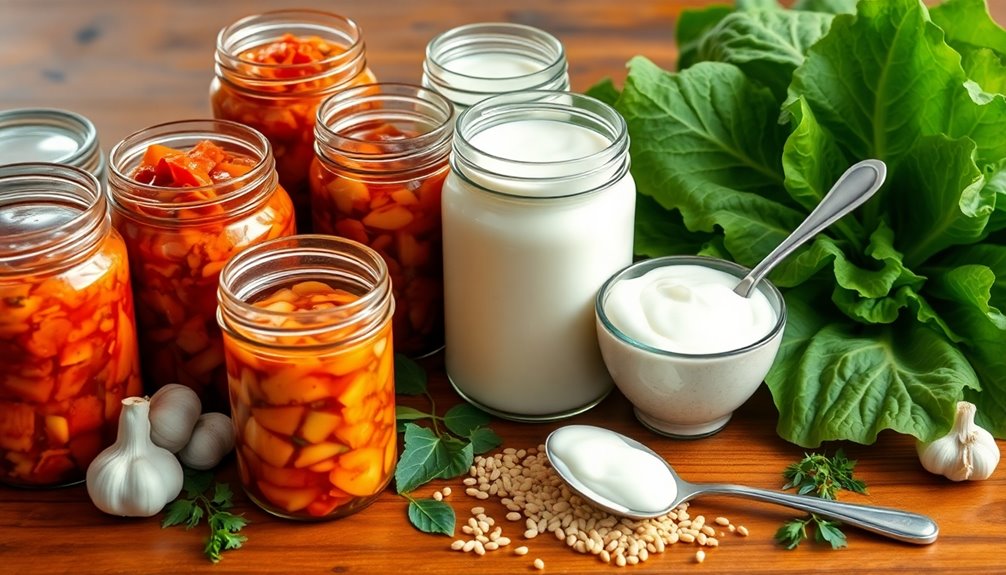Fermented foods like kimchi and yogurt are a fantastic addition to your diet. They're packed with probiotics that support a healthy gut and enhance digestion. These foods also boost your immune system by improving nutrient absorption. Plus, they can positively impact your mood and cognitive function through the gut-brain connection. On top of their health benefits, they offer unique flavors and textures that can elevate your meals. By including more of these delicious options in your cooking, you'll explore their culinary potential and discover even more benefits hidden within them.
Key Takeaways
- Fermented foods like kimchi and yogurt are rich in probiotics, promoting a healthy gut microbiome and aiding digestion.
- The fermentation process enhances nutrient bioavailability, increasing the absorption of vitamins and minerals in the body.
- Regular consumption of fermented foods can improve immune function by strengthening the gut barrier and supporting probiotic diversity.
- Fermented foods contribute to mental well-being by influencing neurotransmitter production and mood regulation through the gut-brain connection.
- Their unique flavors and textures from fermentation techniques offer creative culinary possibilities, enriching meals while providing health benefits.
Nutritional Profile of Fermented Foods

Fermented foods offer a diverse and robust nutritional profile that can greatly enhance your diet. These foods, including kimchi, yogurt, and sauerkraut, are loaded with beneficial nutrients that can support your overall health. One standout feature of fermented foods is their rich variety of probiotic strains. These live microorganisms can help maintain a balanced gut flora, which is essential for digestion and overall well-being. Consuming foods rich in probiotics can help you feel more energized and even improve your mood!
In addition to probiotics, fermented foods boast impressive enzyme content. Enzymes play a vital role in breaking down complex nutrients, making it easier for your body to absorb vitamins and minerals.
For example, the enzymes in yogurt can help digest lactose, which is particularly advantageous if you're lactose intolerant. The fermentation process also enhances the bioavailability of certain nutrients, meaning your body can utilize them more effectively. Furthermore, incorporating plant-based foods into your diet can significantly boost your intake of these beneficial nutrients.
Incorporating a variety of fermented foods into your meals not only adds exciting flavors but also connects you with a global culinary tradition. You'll find that enjoying these foods can foster a sense of belonging within a community that values health and wellness.
Gut Health and Digestion

A balanced gut flora plays a vital role in maintaining your digestive health. When your gut microbiome is thriving, it supports proper digestion and nutrient absorption, helping you feel your best.
Fermented foods like kimchi and yogurt are packed with probiotics—beneficial bacteria that promote a healthy probiotic balance. Including these foods in your diet can enhance your microbiome health, leading to improved digestion and overall well-being.
When you consume fermented foods, you're introducing live cultures that help diversify your gut bacteria. This diversity is essential because a varied microbiome can better break down complex foods, making digestion smoother.
You might find that incorporating more fermented foods reduces bloating and discomfort after meals, fostering a greater sense of comfort in your daily life.
Moreover, a well-balanced gut flora can influence your appetite and cravings. By nurturing your microbiome health with foods rich in probiotics, you're not just supporting digestion; you're also encouraging a healthier relationship with food.
You'll likely notice that as your gut health improves, your overall mood and energy levels may also get a boost. Additionally, a strong gut microbiome can contribute to successful weight loss by optimizing your metabolism and enhancing nutrient absorption.
Immune System Support

Many people underestimate the connection between gut health and immune system support. Your gut is home to trillions of microorganisms, many of which play an essential role in your immune function. When you consume fermented foods like kimchi and yogurt, you're not just enjoying delicious flavors; you're also boosting your body's defenses.
Here are some key benefits of including fermented foods in your diet:
- Enhanced probiotic diversity: Different fermented foods contain various strains of probiotics, which can help balance your gut flora and improve your immune response.
- Strengthened gut barrier: A healthy gut lining prevents harmful pathogens from entering your bloodstream, reducing the risk of infections.
- Improved nutrient absorption: Fermented foods can enhance your body's ability to absorb essential vitamins and minerals, which are crucial for a strong immune system.
Additionally, the gut-brain connection plays a significant role in your overall health. A well-balanced gut can positively influence your mood and stress levels, further supporting immune function. Furthermore, a healthy diet rich in low-carb, anti-inflammatory foods can further enhance your gut health and immune response.
When you nourish your gut with the right foods, you're not just helping your digestion; you're also providing your body with the tools it needs to fend off illness.
Mental Health Benefits

Boosting your mental health might be as simple as adding more fermented foods to your diet. Research shows that fermented foods like kimchi and yogurt can play a significant role in mood regulation and cognitive function. These foods are rich in probiotics, which are beneficial bacteria that support gut health. A healthy gut is linked to improved mental well-being, as it can influence neurotransmitter production, including serotonin, often referred to as the "feel-good" hormone. Additionally, studies from Emory University School of Medicine indicate that gut health can significantly impact overall mental health.
When you incorporate fermented foods into your meals, you're not just enjoying delicious flavors, but also nurturing your mind. Here's a quick look at some of the benefits of popular fermented foods:
| Fermented Food | Mood Regulation Benefits | Cognitive Function Benefits |
|---|---|---|
| Kimchi | Can reduce symptoms of anxiety and depression | May enhance memory and learning |
| Yogurt | Supports emotional resilience | Improves focus and mental clarity |
| Sauerkraut | Boosts overall mood | Aids in stress management |
| Kefir | Helps maintain emotional balance | Supports brain health |
| Tempeh | Enhances feelings of well-being | May reduce cognitive decline
Variety and Culinary Uses

Exploring the variety of fermented foods can open up a world of culinary possibilities. From tangy kimchi to creamy yogurt, you'll find that each fermented food brings its own unique flavors and textures to the table. These foods not only enhance your meals but also provide numerous health benefits. With a little creativity, you can incorporate them into your everyday cooking.
Consider the following delicious options:
- Kimchi Tacos: Combine spicy kimchi with grilled meat, fresh veggies, and a drizzle of sauce for a delightful fusion dish.
- Yogurt Dressings: Use yogurt as a base for dressings or dips, mixing in herbs and spices for an invigorating touch to salads or veggie platters.
- Fermented Sauces: Try using miso or fermented hot sauce to elevate your stir-fries and marinades, adding depth and umami.
When it comes to flavor pairings, fermented foods shine. They can balance rich dishes, enhance freshness, and even spark creativity in your meal planning. Additionally, embracing natural calorie cycles can help you enjoy these foods while maintaining a balanced diet.
The diverse fermentation techniques used across different cultures—like lacto-fermentation for pickles or the culturing of dairy for yogurt—offer a rich tapestry of tastes to explore.
Tips for Incorporating Fermented Foods

Incorporating fermented foods into your diet can be both simple and rewarding. Start by exploring a variety of fermented food recipes that appeal to your taste buds. Consider adding yogurt, kimchi, sauerkraut, or kombucha to your meals. These foods not only enhance flavors but also introduce beneficial probiotics that support gut health. Moreover, homemade smoothies can be a great way to include fermented ingredients like yogurt while also boosting your protein intake.
To get started, try making your own yogurt or sauerkraut at home. The fermentation process explanation is straightforward. For yogurt, you just need milk and a starter culture. Heat the milk, let it cool, mix in the culture, and let it sit in a warm place for several hours.
For sauerkraut, finely chop cabbage, mix it with salt, and pack it tightly in a jar. Allow it to ferment for a week or two, and you'll have a delicious, tangy addition to your meals.
You can also easily incorporate store-bought options. Add kimchi as a side dish, swirl yogurt into smoothies, or use sauerkraut on sandwiches. Don't hesitate to experiment and find what you love. Joining a community or forum focused on fermented foods can provide support and inspiration as you explore new recipes and techniques.
Frequently Asked Questions
Are All Fermented Foods Created Equal in Health Benefits?
Not all fermented foods are created alike when it comes to health benefits. While many provide probiotics, some fermented drink alternatives might lack the same live cultures.
It's crucial to take into account fermented food safety as well; improper fermentation can lead to harmful bacteria. Always select products that are appropriately prepared and stored.
Can Fermented Foods Be Harmful for Certain Individuals?
Have you ever wondered if that delicious kimchi could actually cause you trouble?
For some individuals with specific health conditions or allergies, fermented foods might lead to discomfort or adverse reactions.
It's vital to pay attention to quantity and enjoy these foods in moderation.
While many thrive on them, others may find they need to limit their intake.
Always listen to your body and consult a healthcare professional if unsure!
How Do Fermentation Methods Vary Across Cultures?
Fermentation methods vary widely across cultures, reflecting unique traditional practices and ingredients. You'll find that in some regions, people use specific vegetables or grains, while others rely on distinct microbes for flavor and preservation.
For instance, while kimchi is a staple in Korea, miso is central to Japanese cuisine. These cultural differences not only showcase diversity but also create a sense of belonging and identity, connecting communities through their shared culinary heritage.
What Is the History of Fermented Foods Globally?
You might think fermented foods just popped up yesterday, but they actually boast a rich history! Across cultures, these foods held immense cultural significance, often tied to traditional practices passed down through generations.
As time marched on, fermentation techniques evolved, leading to modern adaptations that keep these age-old flavors alive.
Are There Any Potential Side Effects of Consuming Fermented Foods?
You might experience some side effects from consuming fermented foods. While they can boost gut health, some people report digestive issues like bloating or gas, especially if they're not used to them.
If you've got allergies, be cautious, as certain fermented products might trigger reactions. It's all about finding what works for you—listen to your body and adjust your intake accordingly to enjoy the benefits without discomfort.
Conclusion
Incorporating fermented foods like kimchi and yogurt into your diet is like planting seeds in a garden; with the right care, they'll flourish and bring vibrant health. These foods nourish your gut, bolster your immune system, and even support your mental well-being. By embracing the variety and culinary potential of fermented foods, you're not just adding flavor to your meals; you're cultivating a thriving ecosystem within your body. So why not start your fermentation journey today?



